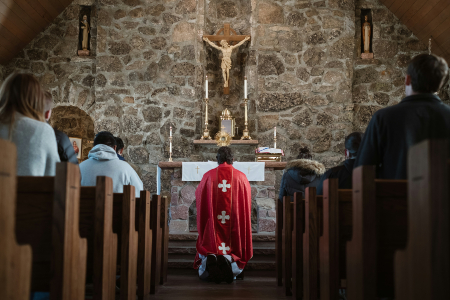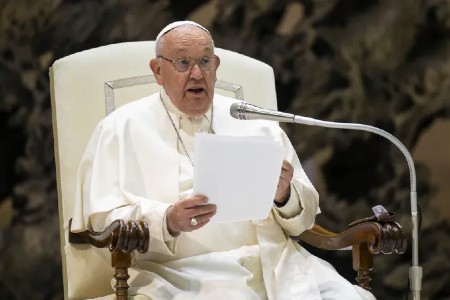 Hi readers, it seems you use Catholic Online a lot; that's great! It's a little awkward to ask, but we need your help. If you have already donated, we sincerely thank you. We're not salespeople, but we depend on donations averaging $14.76 and fewer than 1% of readers give. If you donate just $5.00, the price of your coffee, Catholic Online School could keep thriving. Thank you. Help Now >
Hi readers, it seems you use Catholic Online a lot; that's great! It's a little awkward to ask, but we need your help. If you have already donated, we sincerely thank you. We're not salespeople, but we depend on donations averaging $14.76 and fewer than 1% of readers give. If you donate just $5.00, the price of your coffee, Catholic Online School could keep thriving. Thank you. Help Now >
John of Salisbury
FREE Catholic Classes
(JOHANNES DE SARESBERIA, surnamed PARVUS).
Born about 1115; died 1180; a distinguished philosopher, historian, churchman, and scholar. Born near Salisbury, he went at an early age to Paris, where he studied arts and philosophy (1136-38) under Peter Abelard, Alberic of Reims, and Robert of Melun ; then under William of Conches, Richard l'Evêque, and Theoderic of Chartres at the famous school at this latter town (1138-40); finally again at Paris, completing his studies in theology under Gilbert de La Porrée, Robert Pullus , and Simon of Poissy (1141-45). This solid education, under such brilliant masters, he perfected by some private teaching, perhaps with his lifelong friend Peter, Abbot of Moutier La Celle, near Troyes, with whom he was living in 1148. At the Council of Reims in this year, he was introduced to Theobald, Archbishop of Canterbury, by St. Bernard. After spending a few years at the papal Court at Rome, whither he went from Reims with Pope Eugene III , he returned to England and acted as private secretary to Theobald for several years, during which period he was repeatedly sent on delicate and important diplomatic missions to the Holy See, in 1159 he had "ten times crossed the Alps on his road from England " (Metalogicus, iii, prol., p. 113).
We ask you, humbly: don't scroll away.
Hi readers, it seems you use Catholic Online a lot; that's great! It's a little awkward to ask, but we need your help. If you have already donated, we sincerely thank you. We're not salespeople, but we depend on donations averaging $14.76 and fewer than 1% of readers give. If you donate just $5.00, the price of your coffee, Catholic Online School could keep thriving. Thank you.Help Now >
He was thus brought into intimate relations with princes and popes, especially with Henry II and his chancellor, Thomas à Becket, and with Pope Adrian IV, also an Englishman. In defending the rights of the Church, he incurred the kings displeasure in 1159 — when his forced seclusion enabled him to complete his two principal works the "Policraticus" and the "Metalogicus", both dedicated to Thomas à Becket — and again in 1163, when he was obliged to quit England. The next six years he spent with his friend Peter of La Celle, now Abbot of St. Remigius at Reims. Here he wrote "Historia Pontificalis". Thomas à Becket, who had succeeded Theobald as Archbishop of Canterbury in 1162, was soon obliged to follow John into exile. The latter steadily endeavoured to promote the cause of peace hetween the English king on the one hand and his archbishop and the Holy See on the other. Apparent success crowned those efforts in 1170, when both exiles returned. In a few months (29 Dec.) John witnessed the tragic murder of the saintly archbishop in the cathedral at Canterbury. In 1174 John became treasurer of Exeter cathedral. In 1176 he was appointed Bishop of Chartres. He attended the Third Lateran Council in 1179 and died the next year. He was interred in the monastery of St. Josaphat, near Chartres.
John of Salisbury was one of the most cultured scholars of his day. Notwithstanding the engrossing cares of his diplomatic career, his great learning and indefatigable industry enabled him to carry on an extensive and lifelong correspondence on literary, educational, and ecclesiastical topics with the leading scholars of Europe. His collected letters (over 300 in number), no less than his other works, form an invaluable source of the history of thought and activity in the twefth century. His fine taste and superior training made him the most elegant Latin writer of his time. He is equally distinguished as an historian and as a philosopher : he was the first medieval writer to emphasize the importance of historical studies in philosophy and in all other branches of learning. Naturally of an eclectic turn, he displayed in philosophy a remarkably sound and judicious critical spirit. Familiar with all the phases of contemporary scholastic controversies, he was himself among the first to formulate clearly the solution known as "moderate realism " in answer to the fundamental philosophical problem of the value and significance of universal ideas.
Works
The "Metalogicus" is a philosophical treatise in four books, in defence of the study of logic and philosophy, against a group of obscurantists whom he nicknamed Cornificians . It is the first medieval treatise to show acquaintance with the whole of Aristotle's "organon". The "Policraticus", in eight books, deals, as its sub-title ( De nugis curialium et vestigiis philosophorum ) indicates, partly with philosophy and learning and readable miscellaneous compilation. The "Entheticus" ( De dogmate philosophorum ) is a Latin elegiac poem of 1852 lines, apparently intended as an introduction to the "Policraticus", and covering practically the same ground in briefer form. The authenticity of the "De Septem Septenis", a brief on the seven liberal arts, is doubted by Hauréau (Nouvelle Biographie Générale, xxv, 539, 1858) and Schaarschmidt (pp. 278 sq.) The "Historia Pontificalis" was first published by Arndt (Monumenta Germaniae Historica, xx, 517-45, 1868), and identified as the work of John, by Giesebrecht (Bay. Akad. d. Wissensch., Munich, 1873, 124). The actual manuscript carries on the Gembloux continuation of Sigebert from 1148 to 1152. It was written about 1164, and dedicated to Peter of La Celle. John also wrote a "Vita Sti. Anselmi" (1163), a "Vita Sti. Thomae Cantuar." (1171), and the letters already referred to. All these works (except "Hist Pont.") were edited by Giles, 5 vols., London, 1848, reprinted in P.L. CXCIX; "Policraticus, also ed. C.C.J. Webb (2 vols., Oxford, 1909). The materials for John's biography are contained mainly in his own letters and other works, and on the letters of Peter of La Celle.
 Hi readers, it seems you use Catholic Online a lot; that's great! It's a little awkward to ask, but we need your help. If you have already donated, we sincerely thank you. We're not salespeople, but we depend on donations averaging $14.76 and fewer than 1% of readers give. If you donate just $5.00, the price of your coffee, Catholic Online School could keep thriving. Thank you. Help Now >
Hi readers, it seems you use Catholic Online a lot; that's great! It's a little awkward to ask, but we need your help. If you have already donated, we sincerely thank you. We're not salespeople, but we depend on donations averaging $14.76 and fewer than 1% of readers give. If you donate just $5.00, the price of your coffee, Catholic Online School could keep thriving. Thank you. Help Now >
For John of Salisbury and the Bull "Laudabiliter", see ADRIAN IV.
Join the Movement
When you sign up below, you don't just join an email list - you're joining an entire movement for Free world class Catholic education.
-

-
Mysteries of the Rosary
-
St. Faustina Kowalska
-
Litany of the Blessed Virgin Mary
-
Saint of the Day for Wednesday, Oct 4th, 2023
-
Popular Saints
-
St. Francis of Assisi
-
Bible
-
Female / Women Saints
-
7 Morning Prayers you need to get your day started with God
-
Litany of the Blessed Virgin Mary
U.S. Catholic Parishes Experience Resurgence of Traditional Practices
-

Pope Francis Urges Faith and Prayers for Peace
-

Florida Welcomes Volunteer Chaplains to Public Schools
-
10 Fascinating Details About St. Joseph the Worker: Celebrating His Feast Day - May 1
-
St. Joseph the Worker: Model for Men, Young and Old
Daily Catholic
 Daily Readings for Thursday, May 02, 2024
Daily Readings for Thursday, May 02, 2024 St. Athanasius: Saint of the Day for Thursday, May 02, 2024
St. Athanasius: Saint of the Day for Thursday, May 02, 2024 The Our Father: Prayer of the Day for Thursday, May 02, 2024
The Our Father: Prayer of the Day for Thursday, May 02, 2024- Daily Readings for Wednesday, May 01, 2024
- St. Marculf: Saint of the Day for Wednesday, May 01, 2024
- To Saint Peregrine: Prayer of the Day for Wednesday, May 01, 2024
We ask you, humbly: don't scroll away.
Hi readers, it seems you use Catholic Online a lot; that's great! It's a little awkward to ask, but we need your help. If you have already donated, we sincerely thank you. We're not salespeople, but we depend on donations averaging $14.76 and fewer than 1% of readers give. If you donate just $5.00, the price of your coffee, Catholic Online School could keep thriving. Thank you.Help Now >
![]()
Copyright 2024 Catholic Online. All materials contained on this site, whether written, audible or visual are the exclusive property of Catholic Online and are protected under U.S. and International copyright laws, © Copyright 2024 Catholic Online. Any unauthorized use, without prior written consent of Catholic Online is strictly forbidden and prohibited.
Catholic Online is a Project of Your Catholic Voice Foundation, a Not-for-Profit Corporation. Your Catholic Voice Foundation has been granted a recognition of tax exemption under Section 501(c)(3) of the Internal Revenue Code. Federal Tax Identification Number: 81-0596847. Your gift is tax-deductible as allowed by law.








 Daily Readings for Thursday, May 02, 2024
Daily Readings for Thursday, May 02, 2024 St. Athanasius: Saint of the Day for Thursday, May 02, 2024
St. Athanasius: Saint of the Day for Thursday, May 02, 2024 The Our Father: Prayer of the Day for Thursday, May 02, 2024
The Our Father: Prayer of the Day for Thursday, May 02, 2024
